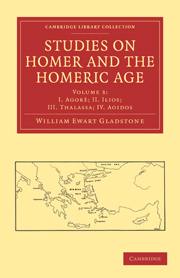Book contents
- Frontmatter
- ADVERTISEMENT
- Contents
- I AGORÈ OR THE POLITIES OF THE HOMERIC AGE
- II ILIOS
- III THALASSA
- EXCURSUS I
- EXCURSUS II
- IV AOIDOS
- SECT. I On the Plot of the Iliad
- SECT. II The Sense of Beauty in Homer: human, animal, and inanimate
- SECT. III Homer's perception and use of Number
- SECT. IV Homer's Perceptions and Use of Colour
- SECT. V Homer and some of his Successors in Epic Poetry: in particular, Virgil and Tasso
- SECT. VI Some principal Homeric Characters in Troy. Rector: Helen: Paris
- SECT. VII The declension of the great Homeric Characters in the later Tradition
- Plate section
SECT. I - On the Plot of the Iliad
Published online by Cambridge University Press: 05 October 2010
- Frontmatter
- ADVERTISEMENT
- Contents
- I AGORÈ OR THE POLITIES OF THE HOMERIC AGE
- II ILIOS
- III THALASSA
- EXCURSUS I
- EXCURSUS II
- IV AOIDOS
- SECT. I On the Plot of the Iliad
- SECT. II The Sense of Beauty in Homer: human, animal, and inanimate
- SECT. III Homer's perception and use of Number
- SECT. IV Homer's Perceptions and Use of Colour
- SECT. V Homer and some of his Successors in Epic Poetry: in particular, Virgil and Tasso
- SECT. VI Some principal Homeric Characters in Troy. Rector: Helen: Paris
- SECT. VII The declension of the great Homeric Characters in the later Tradition
- Plate section
Summary
Although the hope has already been expressed at the commencement of this work, that for England at least, the main questions as to the Homeric poems have well nigh been settled in the affirmative sense; yet I must not pass by without notice the recently propounded theory of Grote. I refer to it, partly on account of the general authority of his work; for this authority may give a currency greater than is really due to a portion of it, which, as lying outside the domain of history proper, has perhaps been less maturely considered than his conclusions in general. But it is partly also because I do not know that it has yet been treated of elsewhere; and most of all because the discussion takes a positive form ; for the answer to his argument, which perhaps may be found to render itself into a gratuitous hypothesis, depends entirely upon a comprehensive view of the general structure of the poem, and the reciprocal relation and adaptation of its parts.
Grote believes, that the poem called the Iliad is divisible into two great portions: one of them he conceives to be an Achilleis, or a poem having for its subject the wrath of Achilles, which comprises the First Book, the Eighth, and all from the Eleventh to the Twentysecond Books inclusive; that the Books from the Second to the Seventh inclusive, with the Ninth and Tenth, and the two last Books, are portions of what may be called an Ilias, or general description of the War of Troy, which have been introduced into the original Achilleis, most probably by another hand ; or, if by the original Poet, yet to the destruction, or great detriment, of the poetic unity of his work.
- Type
- Chapter
- Information
- Studies on Homer and the Homeric Age , pp. 366 - 396Publisher: Cambridge University PressPrint publication year: 2010First published in: 1858



